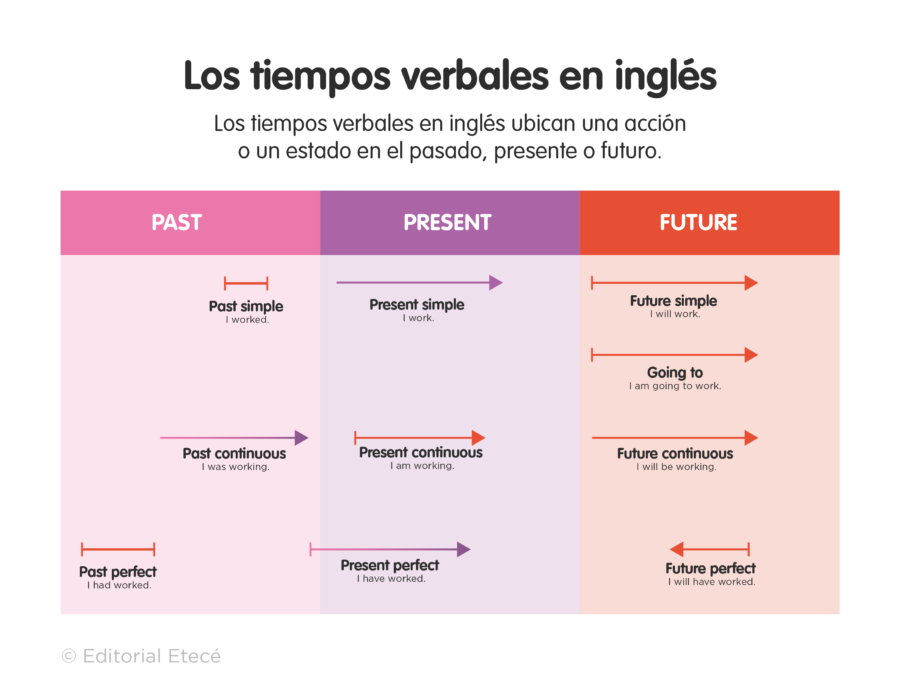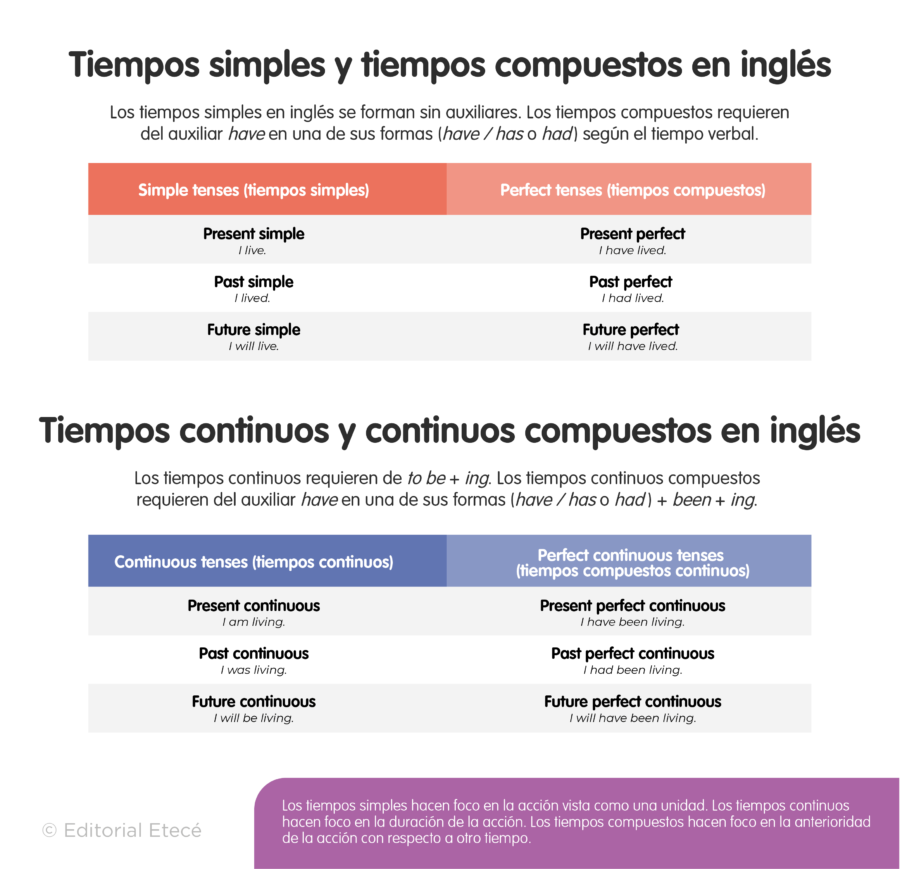Índice
El future perfect es un tiempo verbal en inglés que se utiliza para expresar acciones que habrán sido realizadas antes de un momento futuro. Por ejemplo: I will have graduated by the end of the year. / Me habré graduado para fin de año.
El future perfect implica situarse en un tiempo futuro y mirar hacia atrás, hacia un “pasado”, que (desde el presente) aún no ocurrió.

Oraciones afirmativas en future perfect
- I will have finished the book by Friday.
Habré terminado el libro para el viernes. - They will have arrived by now.
Ellos ya habrán llegado. - It will have stopped raining by noon.
Habrá dejado de llover para el mediodía. - I will have visited Machu Picchu before I turn 25.
Habré visitado Machu Pichu para cuando tenga 25. - They will have moved by 2025.
Se habrán mudado para 2025. - Granddad will have retired by then.
El abuelo se habrá retirado para ese entonces. - By May, we will have known each other for three years.
Para mayo, nos habremos conocido durante tres años. - He will have left by the time we arrive.
Él se habrá ido para cuando lleguemos. - By the end of the year, we will have been together for two years.
Para fin de año, habremos estado juntos durante dos años. - The plane will have already taken off.
El avión ya habrá despegado. - She will have planned everything before the trip.
Ella habrá planeado todo antes del viaje. - The teacher will have taught all the contents by Friday.
El profesor habrá enseñado todos los contenidos para el viernes. - The effects of climate change will have worsened by the end of this decade.
Los efectos del cambio climático se habrán agravado a finales de esta década. - By the end of the century, record temperatures will have been reached.
A finales de siglo se habrán alcanzado temperaturas récord. - Scientists will have discovered a cure for the disease by 2030.
Los científicos habrán descubierto una cura para la enfermedad para 2030. - Fred will have turned 18 years old next time we see him.
Fred habrá cumplido 18 años la próxima vez que lo veamos. - I will have understood the topic by the end of this article.
Habré entendido el tema para el final de este artículo. - The clock will have struck midnight by the time we get there.
El reloj habrá dado la medianoche cuando lleguemos. - The students will have sat for all their exams by the end of the semester.
Los estudiantes habrán rendido todos sus exámenes para el final del semestre. - I will have written my assignment before the deadline.
Habré escrito mi tarea antes de la fecha de entrega. - Sue will have left the party by the time we get there.
Sue se habrá ido de la fiesta para cuando lleguemos. - By the end of the month, Dad will have been working for the company for 10 years.
Para fin de mes papá habrá estado trabajando para la empresa durante 10 años. - The baby will have been born by 30 September.
El bebé habrá nacido para el 30 de septiembre. - In two year’s time, I will have changed jobs.
En dos años habré cambiado de trabajo. - The climbers will have reached the top of Mount Everest by the end of the day.
Los alpinistas habrán llegado a la cima del monte Everest para el final del día. - By the end of August, we will have been living in the same house for four years.
Para finales de agosto, habremos estado viviendo en la misma casa durante cuatro años. - The expedition will have run out of water before they get back.
La expedición se habrá quedado sin agua antes de regresar. - The party will have already started.
La fiesta ya habrá comenzado. - The band will have played my favorite song by the time we get to the concert.
La banda habrá tocado mi canción favorita para cuando lleguemos al concierto. - My friend will have gone to bed by 11 p.m.
Mi amigo se habrá ido a dormir para las 11 p. m. - I will have missed most of my English class by the time I arrive.
Habré perdido la mayor parte de mi clase de inglés para cuando llegue. - By the time he retires, Messi will have scored more goals than any other player.
Para cuando se retire, Messi habrá marcado más goles que cualquier otro jugador. - By the end of the month, Andy will have been playing for the city orchestra for five years.
Para finales de mes, Andy habrá tocado para la orquesta de la ciudad durante cinco años. - We will have made all the necessary arrangements by next weekend.
Habremos hecho todos los arreglos necesarios para el próximo fin de semana.

Oraciones negativas en future perfect
- The guests will not have arrived.
Los invitados no habrán llegado. - The train will not have departed by the time we get to the station.
El tren no habrá partido cuando lleguemos a la estación. - It will not have stopped raining by 10 a.m.
No habrá dejado de llover para las 10 a. m. - The performance will not have ended by the time we get to the theater.
La función no habrá terminado cuando lleguemos al teatro. - The Earth will not have cooled down by next decade.
La Tierra no se habrá enfriado para la próxima década. - It will not have gotten dark by then.
Para entonces no habrá oscurecido. - I will not have learned the lesson before next week.
No habré aprendido la lección antes de la próxima semana. - She will not have forgotten the argument before we see her again.
No habrá olvidado la discusión antes de que la volvamos a ver. - The boys won’t have written the essay by Thursday.
Los niños no habrán escrito el ensayo para el jueves. - The police will not have solved the crime.
La policía no habrá resuelto el crimen. - I will not have done all my homework by 1 p.m.
No habré hecho toda mi tarea a la 1 p. m. - Sally won’t have left home already.
Sally todavía no se habrá ido de casa. - I guess you won’t have heard the news.
Supongo que no habrás escuchado las noticias. - The team won’t have completed the project before the deadline.
El equipo no habrá completado el proyecto antes de la fecha límite. - You won’t have seen the best of the series until the last episode.
No habrás visto lo mejor de la serie hasta el último episodio. - I won’t have read the whole book before I have to give it back.
No habré leído todo el libro antes de tener que devolverlo. - We will not have arrived by then.
No habremos llegado para entonces. - They won’t have delivered the package until tomorrow.
No habrán entregado el paquete hasta mañana. - They will not have released the new Iphone by July.
No habrán lanzado el nuevo Iphone para julio. - The air conditioner will not have been fixed.
El aire acondicionado no habrá sido reparado. - Mark won’t have set off before you call him.
Mark no se habrá marchado antes de que lo llames. - I will not have finished my university studies before the end of 2024.
No habré terminado mis estudios universitarios antes de finales de 2024. - We won’t have bought a new house by next year.
No habremos comprado una nueva casa para el año que viene. - They will not have come up with a solution to the problem.
No se les habrá ocurrido una solución al problema. - Wade and Olivia won’t have gotten married before June.
Wade y Olivia no se habrán casado antes de junio. - The pandemic will not have ended until all the world population is vaccinated.
La pandemia no habrá terminado hasta que toda la población mundial esté vacunada. - The weather won’t have cleared up by tomorrow morning.
El tiempo no habrá mejorado para mañana a la mañana. - They won’t have learned English before they move to England.
No habrán aprendido inglés antes de mudarse a Inglaterra. - Unfortunately, all the survivors will not have been rescued before tonight.
Desafortunadamente, todos los sobrevivientes no habrán sido rescatados antes de esta noche. - The criminal will not have been found.
No habrán encontrado al delincuente. - He won’t have bothered to go.
No se habrá molestado en ir. - My friends won’t have arranged all the details for the party yet.
Mis amigos aún no habrán arreglado todos los detalles para la fiesta. - Candice will not have spoken to the teacher.
Candice no habrá hablado con la profesora.
Preguntas en future perfect
- Will you have finished your university studies by 2025?
¿Habrás terminado tus estudios universitarios para el 2025? - Will we have fulfilled all our dreams by the time we are 40?
¿Habremos cumplido todos nuestros sueños cuando tengamos 40 años? - What will have happened by then?
¿Qué habrá sucedido para ese entonces? - Will they have changed their mind?
¿Habrán cambiado de opinión? - Will the movie have ended by the time we get to the movie theater?
¿Habrá terminado la película cuando lleguemos al cine? - Will the flight have been delayed?
¿Se habrá retrasado el vuelo? - Will we have seen the northern lights by then?
¿Habremos visto la aurora boreal para entonces? - How will they have accomplished their goal before the deadline?
¿Cómo habrán logrado su objetivo antes de la fecha límite? - Which students will have completed the assignment by the end of the quarter?
¿Qué estudiantes habrán completado la tarea para el final del trimestre? - Will the plane have taken off by then?
¿Habrá despegado el avión para entonces? - Will they have analyzed the causes of the incident?
¿Habrán analizado las causas del incidente? - Will the elections have taken place by December?
¿Habrán tenido lugar las elecciones para diciembre? - Will you have cleaned the house by the time we arrive?
¿Habrás limpiado la casa para cuando lleguemos? - Will you have been studying French for two months by the end of the week?
¿Habrás estado estudiando francés durante dos meses para el final de la semana? - Will they have finished their course?
¿Habrán terminado su curso? - Will they have set off before noon?
¿Habrán partido antes del mediodía? - How much will the company have spent on the new software?
¿Cuánto habrá gastado la empresa en el nuevo software? - How long will you have been living in London by the end of the year?
¿Cuánto tiempo habrá vivido en Londres para fin de año? - Who will have arrived by then?
¿Quién habrá llegado para ese entonces? - Which candidate will have been chosen?
¿Qué candidato habrá sido elegido? - Will the storm have stopped by the time of the flight?
¿Habrá parado la tormenta a la hora del vuelo? - Will everything have been prepared by then?
¿Estará todo preparado para entonces? - Will you have considered all the options by tomorrow?
¿Habrás considerado todas las opciones para mañana? - Will you have watched the whole series by Friday?
¿Habrás visto toda la serie para el viernes? - Will they have assembled in the hall by now?
¿Se habrán reunido ya en el salón? - Will the thieves have been arrested?
¿Habrán sido arrestados los ladrones? - Will the children have done their homework?
¿Los niños habrán hecho sus tareas? - Will she have learned the good news?
¿Se habrá enterado de la buena noticia? - Will they have paid off their debt by now?
¿Habrán cancelado ya su deuda? - Will they have thought the matter over?
¿Habrán pensando acerca del asunto? - Will they have chosen to sit for IELTS?
¿Habrán elegido presentarse al IELTS? - Where will they have decided to move?
¿Dónde habrán decidido mudarse? - How many hours will you have worked by the end of the month?
¿Cuántas horas habrás trabajado para fin de mes?
Sigue con:
- Oraciones con “will”
- Oraciones con “will be”
- «Future simple» en inglés
- Oraciones con «will» interrogativo
- Oraciones con “will” y “going to”





¿Te fue útil esta información?
Sí No¡Genial! gracias por visitarnos :)